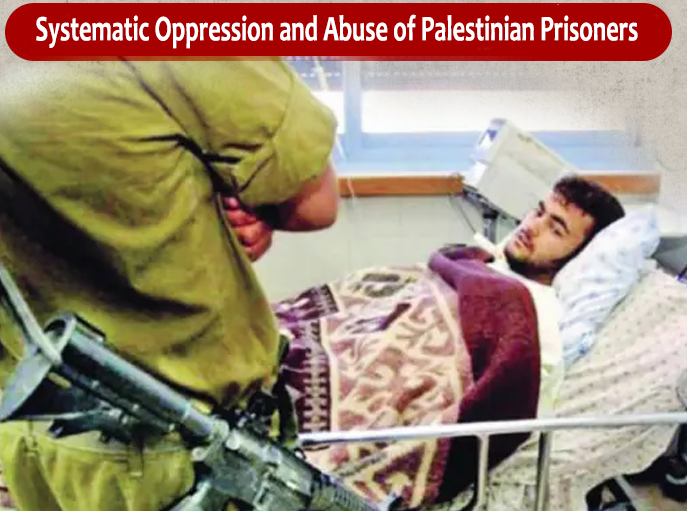Humanitarian Crisis: Systematic Oppression and Abuse of Palestinian Prisoners by Israeli Occupation Forces
Since the beginning of the continuous aggression since the start of the genocide war, the occupation system has adopted severe policies of suppression and revenge against Palestinian prisoners inside its prisons. Despite all the restrictions imposed by the most extremist settler government, repression reached its peak from the outset of the war. Authorities began to suppress, beat, torture, starve, and commit sexual assaults against prisoners.
Hundreds of injuries were recorded among the ranks of prisoners who were assaulted by repression units. Methods of torment varied between thirsting and starving them, in addition to withdrawing all basic necessities of life and keeping them to a minimum. All electrical appliances were withdrawn, isolating them from the outside world. Dozens were crowded into small rooms, with blankets and bedding taken away.
Torture and torment operations concentrated in the camps under the control of the Army and Central Prisons Authority of the “Israeli Prison Service”. Among the well-known prisons is the Negev Prison, where prisoners and detainees have been subjected to horrific suppression methods.
No prisoner was exempt from repression, including children, women, the sick, and the elderly. The death of many prisoners and detainees inside occupation prisons was documented as a result of torture, medical neglect, and harsh living conditions.
Regarding the incident of Gaza detainees, (18) detainees were announced to have been martyred, while the occupation still hides the identities of other martyrs.
We urgently urge the international community to intervene immediately to halt these grave violations of human rights and work toward justice for the victims. Israeli authorities must conduct transparent and independent investigations and hold those responsible for these heinous crimes accountable. The international community must play an effective role in monitoring the situation inside Israeli prisons and camps, and pressure must be applied to ensure respect for international humanitarian law and the rights of prisoners and detainees.
The crime of starvation represents one of the most blatant systematic policies currently employed by the occupying forces against prisoners. This policy has directly impacted their lives and health conditions, leading to the deaths of several individuals. In addition to systematic torture, this policy has exacerbated the suffering of these prisoners.
Furthermore, the starvation policy has resulted in chronic health issues affecting numerous prisoners. The deliberate denial of adequate nutrition has not only compromised their physical health but has also contributed to their deteriorating conditions over time. This systematic approach has inflicted immense suffering and has been used as a means of oppression and control.
The consequences of these actions are profound and extensive, highlighting the severe humanitarian crisis imposed on the prisoners. It is crucial for the international community to be informed about these systematic violations, which violate fundamental human rights and humanitarian standards.
The administration of the occupation prisons deliberately deprived prisoners of the “canteen” they relied on primarily to provide them with adequate food, which they had to purchase themselves. Before the conflict, the prison administration provided only poor-quality meals, both in quantity and variety, which cannot be compared to the meals provided today. Over the years, prisoners have resorted to reheating these meals themselves. Additionally, in the initial stages of the conflict, the prison administration deliberately withheld whatever food remained from prisoners inside their cells and rooms.
Despite the evident effects of the starvation policy on prisoners in recent months, the extremist minister (Ben Gvir) did not stop at crimes committed against prisoners and detainees, including killing them through torture, starvation, and medical neglect. He also incited the killing of prisoners by sniping them in the head, instead of providing them with proper food.
In light of the appeal submitted by human rights organizations to the Supreme Court of the occupation, as part of their efforts on the issue of food provided to prisoners, we affirm that the judicial system of the occupation is the main arm in cementing numerous crimes against prisoners and detainees. However, continued efforts to confront these practices and to continually question the role of this system in the face of the crimes it perpetrates are essential.
The so-called “bad food rations” are meals shared among prisoners, which often are not suitable for consumption. Frequently, especially in military-run detention facilities, expired canned goods have been provided.
The policy of starvation has not only affected adult prisoners but has also impacted children, women, and patients, including those with specific nutritional needs. Pregnant prisoners have been detained without access to proper food, amid dire and harsh conditions. It is noteworthy that among the victims of the starvation policy and the provision of poor-quality food was the martyr, prisoner Mohammed Ahmed Alsabar, who passed away in February of this year.
Furthermore, all the testimonies gathered from prisoners by these institutions clearly reflect this policy and have been crucial in narrating their current plight. Additionally, the images of released prisoners serve as additional evidence.
Medical Crimes: Using the Right to Treatment as a Tool of Torture Scabies as an Example Scabies has spread among Palestinian prisoners and detainees, particularly in Negev and Megiddo prisons, due to measures implemented by the prison administration, significantly exacerbating the disease’s prevalence among them. Numerous testimonies from afflicted prisoners confirm that the prison administration deliberately exploited scabies as a means of torture and mistreatment, disregarding the severe health risks to the prisoners. Additionally, prisoners were unable to diagnose other skin diseases they suffered from.
The absence of basic necessities such as cleaning materials, limited water supplies, and inadequate shower facilities significantly contributed to the spread of diseases. Some prisoners who went out for visits returned with their bodies afflicted by ulcers and severe itching.
Furthermore, all belongings of the prisoners, including their clothing, were confiscated, leaving them with only one set of clothes. This situation worsened due to increased overcrowding in the cells and ongoing daily arrest campaigns.
The lack of ventilation and confinement of prisoners in cells deprived of sunlight further exacerbated the spread of illnesses. The transfer of prisoners with contagious diseases from one section to another resulted in a surge in infections, affecting even the children of prisoners.
Sexual assaults
Have been among the most egregious crimes committed by Israeli occupying forces against Palestinian prisoners, including rape, harassment, strip searches, and threats of rape. In addition to clear statements by the United Nations issued last February confirming credible reports of Gaza detainees being subjected to rape, there are testimonies from other detainees and prisoners confirming they have suffered sexual assaults, including rape.
Discussions about sexual assaults escalated following recent visits by lawyers to detainees from Gaza in the Sdeh Teyman camp, along with accounts and narratives from released prisoners from Gaza shared on social media platforms.
It is affirmed in this case that the occupation has historically engaged in these crimes over decades but at varying levels, reaching a peak since the start of the genocide war, marking an extended phase of unprecedented crimes.

